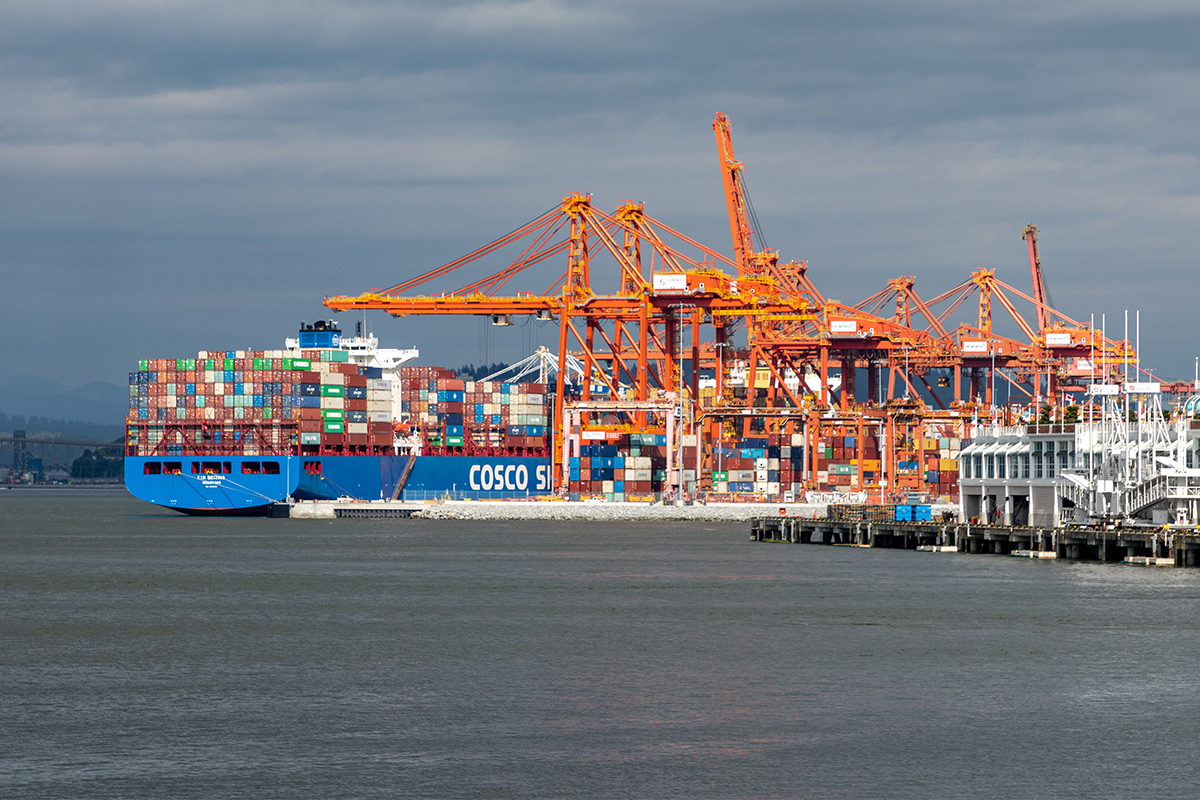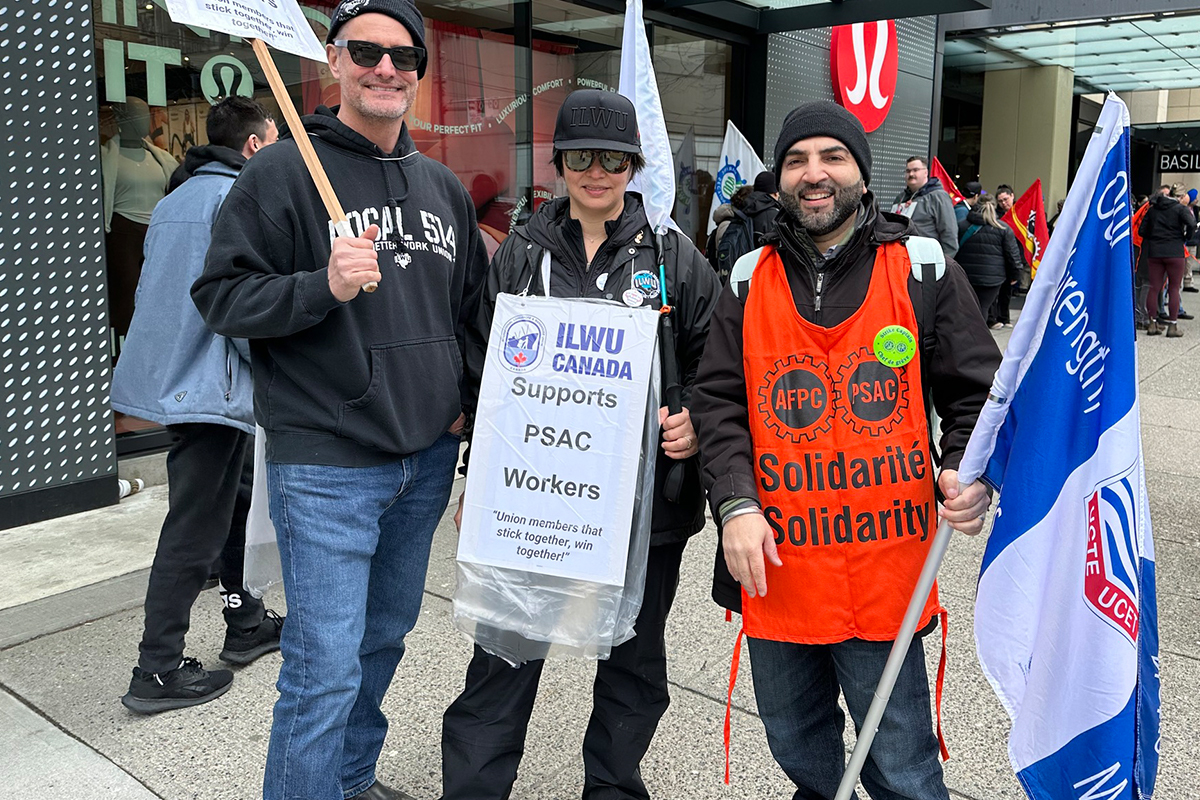
“Vancouver (BC, Canada), Vancouver Centerm Terminal — 2022 — 2151”
/ CC BY-SA 4.0
On June 28, B.C. port workers gave a 72-hour strike notice. Earlier in June, the province’s 12 International Longshore Workers Union (ILWU) locals, representing 7,400 workers across British Columbia voted to strike with a staggering 99.24 per cent mandate. ILWU workers have been on the job without a contract since March. Their key demands are wage increases to keep up with inflation, concerns over contracting out, and control over growing automation of the ports.
The strike notice was filed against the British Columbia Maritime Employers Association (BCMEA) which bargains on behalf of 49 of B.C.’s private waterfront companies across dozens of ports and terminals, moving coal, containers, automobiles, metal ore, fertilizer, grain, wood products, and more, totalling $350 billion in goods a year. The bulk of exports go to China, Japan, South Korea, India, and Taiwan. These are some of the largest overseas exporters in the country; the Port of Vancouver alone touches one of every three dollars of Canada’s trade in goods outside of North America, as well as most imports to the rest of Canada.
This, combined with the militant traditions of the ILWU, means that a strike would have a huge impact on the Canadian economy—and potentially on the Canadian class struggle.
Wages, conditions, automation
The port workers are a key part of the Canadian economy, and many companies rake in big profits on the back of their labour. B.C.-origin export values alone broke a new record in 2022 of $64.5 billion. In exchange, workers work long hours in dangerous conditions for wages that aren’t keeping up with inflation.
While not giving specific details of the union’s demands, the declaration of the president says that they are fighting against contracting out and seeking protection against inflation. Meanwhile, the bosses are asking for “major concessions”. “Their only objective is to take away rights and conditions from longshore workers after having gorged themselves on record profits during the pandemic,” Rob Ashton, president of the ILWU Canada, said in a statement.
Regarding automation, the union has rightfully pointed to the fact that automation is often used as a way to erode the union’s base, and in many cases doesn’t even make ports more efficient. The ILWU has gone as far as opposing the proposed Roberts Bank Terminal 2 expansion on the grounds that an expansion of automation could threaten up to 9,200 marine terminal jobs.
Automation should not be a problem. If every dull, dirty, or dangerous job was automated, this could free up workers to do less menial and more fulfilling tasks, shorten the working day, etc. But under capitalism and the profit motive, this is not possible. Automation only means misery, unemployment, and poverty for the masses while the bosses continue to rake in profits.
In the case of Roberts Bank Terminal 2, the ILWU’s opposition involved backing alternate projects by other companies who claimed that they would guarantee jobs. We’ve seen time and again that the bosses’ promises are hollow. ILWU should demand control over decisions regarding any automation and demand a shortening of the working day or retraining of workers without loss of pay or benefits of any sort. Ultimately, as long as capitalism exists, automation will be a double-edged sword.
Attacks by the bosses
As a thank you for their hard work, the bosses and their media have launched a tirade against longshore workers throughout the continent. One article from a right wing American paper was titled “Lazy crane operators making $250,000 a year exacerbating port crisis, truckers say”, essentially blaming ILWU workers for the bottlenecks at ports.
In response to the potential strike in B.C., the Surrey Board of Trade has urged the Federal government to legislate ILWU back to work in the event of a strike and take away their charter right to withhold their labour.
“It would absolutely impact our supply chain system and it’s unfortunate that the vote was in favour of a strike because already it is challenging for businesses in terms of rising costs, everywhere they go,” said Anita Huberman, CEO of the board. “Inflation remains consistent, there is a potential interest rate increase coming again in the next few months, and higher taxation and regulatory burdens are pushing businesses to the edge of unsustainability,” she added.
But whose fault is that? Did the ILWU raise interest rates? Did the ILWU disrupt global shipping networks? Certainly not. Surrey’s deep-sea terminal is owned by DP World, a company headquartered in Dubai which is the fourth largest terminal operator in the world and whose revenues soared 60 per cent last year to $17.1 billion. Now, it’s workers like those at the ILWU who must shut up and be happy with their lot while the billionaire port owners make off with record profits.
The supply chain bottlenecks in the shipping sector plaguing the world economy are also no fault of the ILWU members. It’s the capitalists who created the just-in-time system where all stockpiles were eliminated, creating supply chains that rely on materials arriving from around the world precisely at the moment they’re needed. While reducing labour and warehousing costs, this also created a ticking time bomb where it became possible for, say, a ship blocking the Suez Canal for a handful of days to disrupt the world economy.
These crises are entirely the creation of capitalist governments and private corporations around the world, who are incapable of managing anything, whether it be the COVID-19 pandemic or the rational distribution of goods and services. All ILWU is trying to do is safeguard some of the only remaining high-paying unionized jobs that are able to keep British Columbian families’ heads above water in the face of a serious affordability crisis.
A militant history
The bosses have reason to be afraid. The ILWU has a long, long history of militant struggle which workers today should draw on for inspiration. From its creation in 1948, the ILWU has fought back against the bosses’ attacks with class struggle methods. For example, in 1966, ILWU defied an anti-union injunction by the Supreme Court of Canada and went on strike when employers would not grant statutory days off. Ten union leaders were arrested and jailed for months, but the union won its demands.
In 2021, ILWU workers in Oakland, California, Vancouver, and Prince Rupert all refused to offload an Israeli ship during the bombing of Gaza.
When supporters of the Wet’suwet’en’s defence of their territory against the RCMP and the Coastal GasLink pipeline expansion blockaded entry into ports in the lower mainland, the Fraser River longshore workers’ union—the ILWU Local 502, with 3,000 members—did not cross their picket line.
Most recently, Seaspan tugboat captains with the Canadian Merchant Service Guild went on strike for a cost of living adjustment in 2022, and were joined by 1,000 other ILWU workers, and workers from other unions, at the Seaspan drydocks who refused to cross their picket line in solidarity. This move was key in ensuring a win for CMSG.

We need to build on this tradition, and prepare for a fight. A victory for the port workers would reverberate across the whole country. It is high time we revive the militant traditions of our movement in every union!
Prepare to fight
If the ILWU hits the picket lines, the bosses will raise a hue and cry, and it is very likely that back-to-work legislation will quickly be on the table. Only two years ago, it was introduced to break the strike of the Montreal dockers. Back-to-work legislation has become the go-to tool of the bosses, who use it to cut the legs out from under any potentially successful strike and undemocratically deny the rights that were hard-won by the labour movement in the past.
Unlike Montreal in 2021 however, we now have the example of the Ontario education workers’ strike from last November. When Premier Doug Ford tried to legislatively overrule their right to strike, the education workers defied, and the entire labour movement in Ontario threatened to stand behind them with a general strike. The legislation was rescinded. This proves that defiance works; workers can break the laws that are meant to break us and win.
After the example of Ontario, governments have been more cautious with back-to-work legislation, but that does not mean that it’s off the table, especially when it affects something as economically important as the Port of Vancouver. The ILWU should be prepared to defy the law, and prepare their membership with that perspective. Furthermore, as in Ontario, the entire labour movement should be prepared to show their solidarity in action.
This could include mass pickets including members of the public, hot edicts on all goods bound for BC, and hard pickets at the docks. The International Longshoremen’s Association in the United States has stated that they will not be accepting any cargo that’s diverted from striking ports. This is an example that should be followed.
The ILWU has a history of respecting picket lines and showing solidarity. It’s time for the entire labour movement to show them the same solidarity. If the strike goes ahead on Sunday, we can expect the bosses to be vicious. The defeat of a union as important and militant as the ILWU would be a defeat for all workers. On the other hand, a victory for the ILWU would be a victory for all. Securing above-inflation pay increases for ILWU workers would show the way forward for the rest of the labour movement and have an impact on unionized and non-unionized workers alike.
Victory to ILWU!
Strike to win!
Picket lines mean do not cross!

